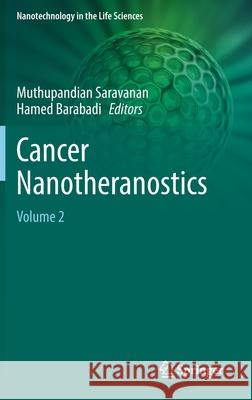Cancer Nanotheranostics: Volume 2 » książka



Cancer Nanotheranostics: Volume 2
ISBN-13: 9783030762629 / Angielski / Twarda / 2021 / 520 str.
Cancer Nanotheranostics: Volume 2
ISBN-13: 9783030762629 / Angielski / Twarda / 2021 / 520 str.
(netto: 616,28 VAT: 5%)
Najniższa cena z 30 dni: 616,85
ok. 16-18 dni roboczych.
Darmowa dostawa!
Muthupandian Saravanan Graduated in Microbiology from Madurai Kamaraj University, India and Doctorate with Specialization in Medical Microbiology and Nanomedicine from Sathyabama University, India. Thereafter, He did a Post-Doctoral Research fellowship focusing his research on Nano-biomaterials & their Biomedical Applications (2011-2012). Prior to postdoc, he worked as an Assistant Professor (SG), SRM University, and Department of Biotechnology for six Years, from 2005 -2011. Presently, Dr. Saravanan working as a Professor, Department of Pharmacology Saveetha Dental college, SIMATS, Chennai, India and worked as Associate Professor, Department of Medical Microbiology and Immunology, Division of Bio-medical Sciences, School of Medicine, College of Health Science, Mekelle University, Ethiopia (2012-2021). His Research Specialization: Development of Novel biomaterials Emerging and Re-emerging Infectious disease and Cancer. He has published more than 150 research paper in Peer-reviewed Journal including high impact Journal with more than 8000 citations and h-index of 42 and i10 index of 85 and also three edited books. He has participated more than 75 National and International conferences, Reviewers of more than 100 international peer-reviewed journals and Guest editor/ Editors for various reputed PubMed and Scopus indexed journals. He has received many fellowships and awards notably, IET- Nanobiotechnology premium Awards two times continuously in the year 2019 and 2020, DST-SERC Young Scientist fellowship in 2011, International Fellowship “Advanced Course on Diagnostics” Sponsored by LSH&TM & Fondation Mérieux, in France 2013, International Fellowship “Pertussis: biology, epidemiology and prevention” meeting Sponsored by Fondation Mérieux & WHO in France 2014, International Union of Microbiological Societies (IUMS) travel grant in 2015 to Canada, International Fellowship "Advanced Course on Antibiotics” (AdCAb) Sponsored by Institute of Pasteur and Fondation Mérieux France, 2016. His area of research includes Medical Microbiology, Antimicrobial Resistance, Nanomedicine, Nanomaterials to combat AMR and Cancer.
1997-2026 DolnySlask.com Agencja Internetowa
KrainaKsiazek.PL - Księgarnia Internetowa









